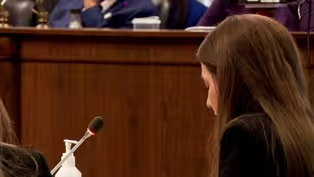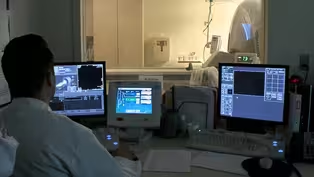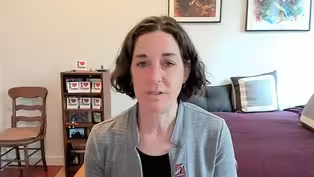NJ Spotlight News
Andrew Lewis interview
Clip: 3/10/2023 | 5m 55sVideo has Closed Captions
Science suggests that there are more complex causes of whale deaths
The ongoing string of dead whales washing up on beaches in New Jersey and New York have been seized upon by opponents of offshore wind development as a reason to halt the industries work. But the actual science behind what is happening remains unclear. It’s not even a sure thing that the number of whale deaths is an unprecedented phenomenon.
Problems playing video? | Closed Captioning Feedback
Problems playing video? | Closed Captioning Feedback
NJ Spotlight News is a local public television program presented by THIRTEEN PBS
NJ Spotlight News
Andrew Lewis interview
Clip: 3/10/2023 | 5m 55sVideo has Closed Captions
The ongoing string of dead whales washing up on beaches in New Jersey and New York have been seized upon by opponents of offshore wind development as a reason to halt the industries work. But the actual science behind what is happening remains unclear. It’s not even a sure thing that the number of whale deaths is an unprecedented phenomenon.
Problems playing video? | Closed Captioning Feedback
How to Watch NJ Spotlight News
NJ Spotlight News is available to stream on pbs.org and the free PBS App, available on iPhone, Apple TV, Android TV, Android smartphones, Amazon Fire TV, Amazon Fire Tablet, Roku, Samsung Smart TV, and Vizio.
Providing Support for PBS.org
Learn Moreabout PBS online sponsorshipNew Jersey scientists and lawmakers are still trying to determine why whales continue washing up onto the Jersey Shore and the question remains whether it's tied to offshore wind development.
Two of New Jersey's Republican congressmen, Representatives Chris Smith and Jeff Van Drew, are calling for a pause on wind farm seismic testing that they say could be impacting whale migration patterns.
They're holding a hearing next week with industry experts to get their take on offshore wind impacts but some say it's not the sonar that's at play here.
Briana Vannozzi spoke with Andrew Lewis, freelance journalist for the environmental digital publication Yale 360 about his research on whale deaths and the impact of sound on the marine mammals.
Andrew, we've been hearing from a number of groups even elected officials that this is an unprecedented number of whale deaths but your reporting shows this has happened before so is it less unusual than we've been led to think?
Yeah it is um I was struck by that that claim that it was unprecedented as well and that's something that I really wanted to look into.
So um I just referred to the publicly available uh you know website that NOA has for anyone to check out and it's basically it covers all of the whale strandings by date, by location since this unusual mortality event has since it began, for humpback whales in 2016.
And pretty quickly you know as I started going through each year and looking at the map something popped out at me and that was a 2016-2017 event in Virginia around the mouth of the Chesapeake Bay.
Uh it was pretty striking in terms of being the same three months so December, January, February uh similar amount of animals stranded, similar spatial distance.
So from the northern point of the you know the northernmost stranding to the southernmost stranding and um you know days between stranding.
So at that point I just started looking through the all of the other data and it became quite clear to me that this wasn't a three-month problem this is this is truly a you know a seven year problem.
Much more than a coincidence there.
Well I mean some of the arguments that we've heard from activists is that seismic testing from offshore wind development could be to blame.
What does the science tell us?
So I think it's important to be clear that noise is a big concern among marine mammal scientists.
Military sonar testing has been proven to uh disrupt the behavior of humpback whales to the point that they do strand.
Noise again is just it's a constant concern that um you know scientists are doing a lot of research into and quite frankly don't know much about and um in terms of seismic testing that's done you know for the oil and gas industry it's at an entirely different and far more intense so lower uh lower frequency uh than than the equipment that's being used by the offshore wind companies right now um you know off of off the coast of New Jersey.
So you know again while it's important to to be aware of of the of the risks of noise uh I think we have to be more careful about how we think about all of the nuances that come into play with regard to salinity and water depth and all of these things that scientists tell me you know make a huge difference when it comes to how sound is um you know it impacts marine mammals.
So it's just an incredibly complex um circumstance and it's kind of rife for confusion.
Well I'd love to get your take then on the argument next week in fact two of New Jersey's congressional lawmakers, Republicans, are going to be holding an event.
They're calling for a pause on the development of offshore wind so I'd love to get your take on that argument given what we know and the fact that you know that part of it hasn't been fully investigated.
Yeah you know I think, if they want to call for a pause um that's fine but I think what the problem here is the is the the issue um by which they're they're hanging the argument on.
You know you can be pro-offshore wind, you can be anti-offshore wind but that's not really the point in this situation.
The point in this situation is that uh a falsehood that you know virtually every scientist that I've talked to says you know it's just it's unsubstantiated it doesn't it it doesn't factor into what's happening right now with with the whales.
So it's you know it's not an issue of for or against it's that that they're sort of trafficking um you know in in something that's incorrect that's inaccurate and and it's now sort of hijacked the narrative of this situation and it just it's worrisome I think to the scientists that that you know entire hearings might be um taken up and based upon something that's that's pretty much unknown within science.
Andrew Lewis for us.
Andrew, great reporting thanks so much for sharing it with us.
Thank you Briana.
Business Report: Strong jobs report
Video has Closed Captions
Clip: 3/10/2023 | 2m 24s | The U.S. economy added 311,000 new jobs in February (2m 24s)
Critical shortage of asthma, allergy medication
Video has Closed Captions
Clip: 3/10/2023 | 4m 14s | The main manufacturer of albuterol shut down plants, including one in Parsippany (4m 14s)
Lawmakers advance bills to help domestic abuse survivors
Video has Closed Captions
Clip: 3/10/2023 | 4m 9s | Advocates say the measures would help thousands of victims across New Jersey (4m 9s)
More screening urged for colorectal cancer
Video has Closed Captions
Clip: 3/10/2023 | 5m 4s | Health care experts, survivors try to raise awareness as cases rise among younger adults (5m 4s)
Rutgers faculty, grad students OK unions to call a strike
Video has Closed Captions
Clip: 3/10/2023 | 4m 29s | Rebecca Givan, union president, discusses the overwhelming vote in favor (4m 29s)
Providing Support for PBS.org
Learn Moreabout PBS online sponsorship
- News and Public Affairs

Top journalists deliver compelling original analysis of the hour's headlines.

- News and Public Affairs

FRONTLINE is investigative journalism that questions, explains and changes our world.












Support for PBS provided by:
NJ Spotlight News is a local public television program presented by THIRTEEN PBS




